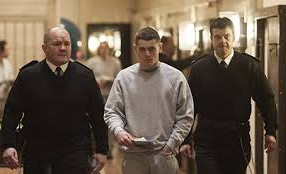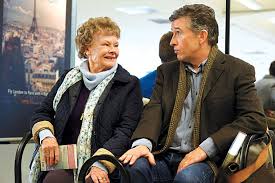Starred Up – Film
 Starred Up is a brutal look into the life of Eric (played by an excellent Jack O’Connell from television’s Skins), a 19 year-old who has been transferred from a juvenile detention centre to prison.
Starred Up is a brutal look into the life of Eric (played by an excellent Jack O’Connell from television’s Skins), a 19 year-old who has been transferred from a juvenile detention centre to prison.
 Starred Up is a brutal look into the life of Eric (played by an excellent Jack O’Connell from television’s Skins), a 19 year-old who has been transferred from a juvenile detention centre to prison.
Starred Up is a brutal look into the life of Eric (played by an excellent Jack O’Connell from television’s Skins), a 19 year-old who has been transferred from a juvenile detention centre to prison.
 Philomena Lee has spent 50 years looking for the son that was taken away from her, while Steve Coogan plays the ex-government official turned journalist who helps her to find him, in the new film Philomena.
Philomena Lee has spent 50 years looking for the son that was taken away from her, while Steve Coogan plays the ex-government official turned journalist who helps her to find him, in the new film Philomena.
Played by a very good Judi Dench, Philomena Lee, at a very young age, gives birth to a boy out of wedlock, naming him Anthony. The baby was the result of a relationship with a man she met that unfortunately didn’t last, so Philomena ends up in a home for single mothers, Roscrea Convent, in Ireland. There she lives with other single mothers, and they are only given one hour each day to spend with their children, the rest of the hours are spent washing and cleaning and doing other chores. One day an American couple shows up to the home and takes two children with them. One of the children is Philomena’s son Anthony, the other child is Mary, the daughter of her best friend at the institution. 50 years later, and now a mother to an adult daughter, Philomena thinks about Anthony everyday, and has always wondered what happened to him. Her daughter happens to mention her story to Martin Sixsmith (Steve Coogan, who was also the co-writer of this film), a disgraced ex-government official who is attempting to kick off a journalist career and is looking for a story to write about. He discusses Philomena’s story with his editor, and she agrees that it would be a good human interest story to write about. So Martin meets with Philomena to get more information from her about her son and to find out if she is fine with him writing an article about it. Philomena, however, doesn’t have much information to give him. So together they go to the creepy Roscrea and attempt to get Philomena’s records. They are told by the very stern headmistress and nuns that all the records had burned in a fire years ago. Drinking at a local pub, they meet a man who tells them that he had heard rumors that years ago the convent sold babies to American couples. So thus begins Philomena’s and Martin’s journey to find out what exactly happened to Anthony.
This journey takes them to America where Martin uses his contacts there to get more information. Very soon enough, he discovers that the couple who adopted Anthony (Doc and Marge Hess) renamed him Michael. He also discovers that Michael Hess was a high-ranking official in the Republican party in the Reagan administration, gay and closeted. Sixsmith also discovers more information about Michael that he reluctantly has to tell Philomena. As disturbing as the news is, they agree to press on and meet the many people who knew Michael. This includes Mary, the girl who was taken by the same family all those years ago, and Michael’s former partner.
Philomena, based on the true story of Philomena Lee, is a touching and well written film of a woman’s quest to find out what happened to the son that was taken away from her many years ago. Dench is perfectly cast as Philomena, a woman so determined and strong willed (and forgiving) that she practically makes the nuns look evil. Dench cast as Philomena is perfect casting. Look for Dench to be nominated for acting awards for this film. Coogan, in a brilliant move, cast himself as the former wonk turned journalist due to a forced career change. But it is the script, by Coogan, that is the best thing about this film. Coogan has some very good lines, lines that are at times sarcastic, and biting, even when he is with Philomena. And Philomena in turn is given very good lines herself, lines that explain her grief but also her determination and relationship with Sixsmith. Their journey brings them close, two very different people from two very different backgrounds. It is a journey and a story that should be seen by everyone.
 Saving Mr. Banks is a Disney film about a Disney film. So in the telling of the story of the behind the scenes of the making of the 1964 film Mary Poppins, both Disney and Walt Disney are of course prominently featured.
Saving Mr. Banks is a Disney film about a Disney film. So in the telling of the story of the behind the scenes of the making of the 1964 film Mary Poppins, both Disney and Walt Disney are of course prominently featured.





